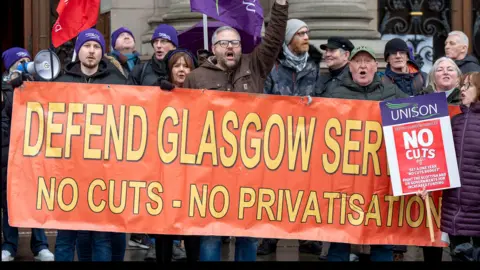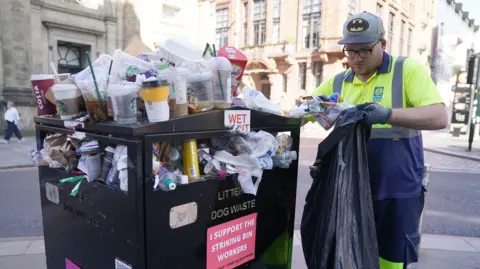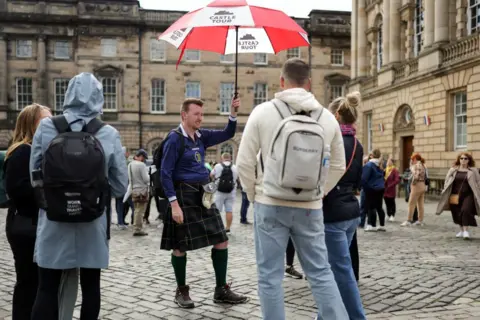Why are we seeing inflation busting council tax rises?
 PA Media
PA MediaLarge council tax rises may come as an unpleasant surprise to many.
There have been no large annual rises in Scotland for some 20 years.
While inflation is currently running at 3% – well down on recent spikes - it looks as though council tax will go up by double or even treble that amount in many areas.
This will come as a disappointment to the Scottish government.
While it made no attempt to cap council tax rises this year, it had hoped that this year's council funding settlement would make large rises unnecessary.
Many councils feel otherwise. So why are they going for large rises?
 PA Media
PA MediaThere are a number of different factors at work which will vary from area to area.
These might include the costs in particular services and wages. A national council strike was narrowly avoided last year and all employers are having to consider the impact of National Insurance rises.
Some councils have dug into their reserves in recent years to balance the books. Ideally this money should only be used in emergencies or for investment projects.
Then there is the impact of years of tight funding settlements.
While some in local government would describe this year's Scottish government funding settlement as a "step in the right direction" they would also make the point that it doesn't make up for many years of tight funding.
Since 2007, the council tax was generally frozen or caps were put in place to limit increases.
Any council which broke a freeze or cap risked losing some government money as a result.
While the Scottish government would argue that these freezes and caps were fully funded, inevitably this mechanism placed limits on the ability of councils to raise revenue. Councils might have wanted more.
 Getty Images
Getty ImagesCouncils have long argued for the right to put up the council tax by whatever amount they agree.
Their argument is that a degree of financial accountability is an important part of local democracy.
A discussion on what sort of local services are needed, they say, also needs to include a discussion on how much revenue to raise.
The big unknown is how voters may feel about large council tax rises.
It is worth noting that, following so many freezes and caps, a council tax bill today will still be lower than a bill from 18 years ago in real terms.
But with so many on tight budgets, any rise now may still prove unpalatable.
Will voters believe their council has taken the wrong decision? Will they think the Scottish government should have maintained freezes and caps? Or might they be happy to pay more rather than see more cuts and savings?
There will be a Holyrood election next year. Council elections are in 2027.
The spectre of large council tax rises comes as councils look at other ways to raise revenue.
Some now charge double council tax on second homes. A number are looking at following Edinburgh and introducing a visitor levy from next year.
But while the council tax accounts for a small proportion of each council's overall budget, it has huge symbolic importance.
It is a charge paid by every household and councils will be aware of the risk that a large rise may be unpopular with some voters.
